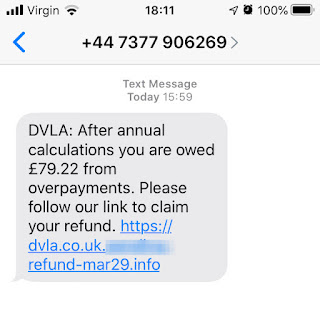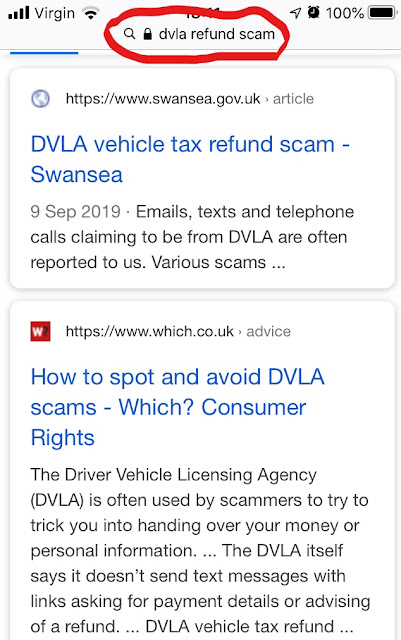Don't worry, that's not an actual link, but you will probably be seeing emails and texts with links like that in the coming weeks. At a time when many people could use a little extra cash, the temptation to click those links can be strong.
 Here in this screenshot you can see one such message came to my iPhone today, supposedly from the UK government office that handles driving licenses, the DVLA.
Here in this screenshot you can see one such message came to my iPhone today, supposedly from the UK government office that handles driving licenses, the DVLA.The links in these messages take you to forms where, in order to get your refund—or other promised payment—you type in your bank account or credit card details.
Sadly, some people will click those links and supply those account details. (The form you see when you click on that link looks quite realistic - see below). Some time later those people will discover that criminals are helping themselves to the account, transferring funds out of bank accounts, running up charges on credit cards.
For example, back during the Great Recession of 2007-2009 I got several calls from otherwise sensible friends asking if some scam or other might just be real. They were hoping that a sudden windfall might really come their way, wishing that an unexpected source of funds might actually materialize. Criminals know these hopes and wishes and exploit them.
Tough times breed twisted crimes!
Of course, when the coronavirus first started to be a hot topic, criminals tried to exploit our eagerness for information as a hook to deceive and defraud. Then they shifted to fake coronavirus cures or deals on medical products in short supply. You may have noticed that security experts were quick to raise red flags about these tactics. That's because there is a well-established body of cybersecurity knowledge which predicts that these types of crimes will be attempted around any attention-grabbing event. Criminals know this too; they realize that there is a relatively small window of opportunity to leverage a timely hook before everyone hears the hook-specific warnings. So the next play in this particular chapter of the cybercrime playbook is to use deceptive messaging that is not linked to the current crisis, but still taps the desperate hopes and needs that the crisis has generated.
Criminals know this too; they realize that there is a relatively small window of opportunity to leverage a timely hook before everyone hears the hook-specific warnings. So the next play in this particular chapter of the cybercrime playbook is to use deceptive messaging that is not linked to the current crisis, but still taps the desperate hopes and needs that the crisis has generated.What to do?
Be wary of any message or email that you receive if it offers you money or other benefits, particularly if you were not expecting them.
If you have any doubts, just use your phone or computer to search for a few words from the message, maybe adding the word scam for good measure.
As you can see from the screenshot on the right, when I did that on my iPhone the search results immediately provided me with enough information to know that this was a fraudulent message, containing a link that I definitely should not click, regardless of how much I wanted the money.
Remember: Think before you click!

No comments:
Post a Comment